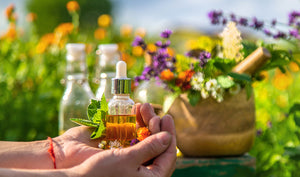The hormonal fluctuations that occur as women transition through the stages of menopause can bring about a variety of unwanted and often challenging symptoms. While nearly one in four women are fortunate enough to ease through with little disruption to daily life, 77% of women find at least one symptom ‘very difficult’ and 44% experience three or more symptoms that are severe, according to Fawcett Society’s 2022 landmark survey of over 4,000 UK women. Women are most likely to say they find sleeping (84%), brain fog (73%), and anxiety or depression (69%) the most troublesome symptoms. The latter is linked to a decline of oestrogen and testosterone levels in our brains during menopause which can in turn lead to symptoms of low mood, reduced motivation, anxiety and poor sleep – all symptoms of depression. A separate 2019 study of 3,000 women in the UK revealed that a staggering 66% of participants had been inappropriately prescribed antidepressants for low mood associated with their menopause, rather than offering direct menopause support or hormone therapy. This miscorrelation is demonstrative of the alarming legacy of misguided support and poor awareness of the mental impact of menopause, prompting a rally cry for change for The Change.
Fortunately, the pieces of the menopause puzzle are coming together. On social media, on podcasts and in print media, there’s a huge menopause conversation. The modern menopause movement is propelling awareness and recognition, equipping this generation of peri/menopausal women with a clearer understanding of what's happening in their bodies and their minds. We're connecting the dots between what might have previously been considered isolated symptoms and the fluctuations in hormones. Women are less likely to suffer in silence, as their mothers, aunts and grandmothers did, but instead are feeling more empowered than ever before to seek out their options. A survey conducted by the British Menopause Society found that 95% of women would prefer to explore natural remedies before turning to HRT to help keep hot flushes, mood swings and other symptoms at bay. HRT is undeniably a hugely effective support for many women, but for some HRT is not a clinical option; for others, it’s a question of access. Yet for many, this is about a crusade for ownership of their health and their choices.
Many women are drawn to natural and holistic approaches because they align with a more comprehensive view of health and well-being, and can offer a gentler, more balanced approach that supports the body's natural processes. They can be used as standalone treatments or in combination with other therapies, HRT included, to reinforce symptom relief. Natural remedies often focus on addressing the underlying causes of menopausal symptoms, promoting overall wellness, which can sometimes reduce the reliance on synthetic hormones. While everyone is unique, there are plenty of benefits to weigh up when considering herbal medicines for the symptoms of menopause:
- Safety: Herbal medicines, when used appropriately and under the guidance of a qualified practitioner or herbalist, generally have a good safety profile. They can be a viable alternative for women who cannot or choose not to use HRT due to contraindications or personal preferences.
- Holistic Approach: Herbal medicines consider the interplay of various body systems, aiming to restore balance and support overall health. They address menopausal symptoms comprehensively, taking into account physical, emotional, and psychological aspects.
- Individualised Treatment: Herbal remedies can be tailored to an individual's specific needs, considering the unique combination of symptoms experienced during menopause. This personalised approach helps women feel heard and empowered in their health journey.
- Symptom Relief: Many herbal medicines have demonstrated efficacy in reducing menopausal symptoms such as hot flushes, night sweats, mood swings, and sleep disturbances. They work synergistically with the body to promote hormonal balance and alleviate discomfort.
- Fewer Side Effects: Compared to pharmaceutical interventions, herbal medicines often have milder side effects and are generally well-tolerated which can be particularly beneficial for women seeking natural alternatives to manage their menopausal symptoms.
While HRT remains a valuable option for many women, exploring natural and holistic approaches for some are appealing. Whether it’s a personal choice or belief, a desire for a more comprehensive approach to health, or because of a restrictive medical history, herbal medicines can be a valuable addition to your menopausal journey, providing support and relief during this transformative phase of life.
As always, it is important to consult with a qualified healthcare practitioner or medical herbalist who can help you determine what is right for you by looking at your health holistically and tailoring the most appropriate herbs and doses according to your individual needs.

